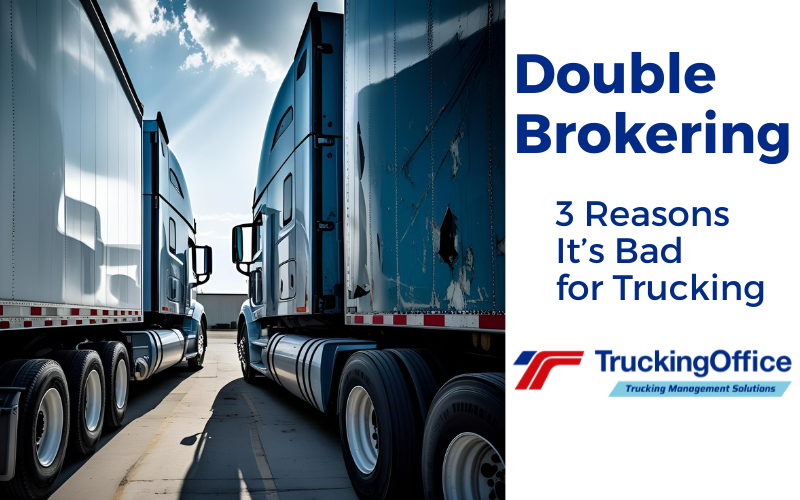If you’re listening to anyone talking about trucking these days, they’re talking about double brokering. So what is it? Why is it bad?
Double Brokering
Double brokering is a practice where a customer hires a trucking company to move freight, and that trucking company hires another trucking company to actually haul the load. Brokers can work the same way – they’ll accept the load, but give the load to another broker to arrange the shipment.
So why is this bad? There are three questions that show the problems.
Who’s moving the goods? Where is the load? Is there insurance on the load?

Who’s Moving the Goods? Double Brokering Hides Dangerous Trucks
The most important thing a client wants to know is that their products are being handled properly and being shipped by responsible truckers. This is why some companies don’t use brokers. They find truckers and vet them, ensuring their equipment can handle the load and the drivers are responsible and careful.
But if a client hires one trucking company, but that trucking company gives that load to another trucker who may be driving a rig that’s not safe or who has a history of not taking good care of the loads? That’s the start of the troubles. Clients have the right and a specific interest in knowing who has their goods. But too often, double brokering hides who is doing the work. Irresponsible truckers with unsafe trucks who are willing to haul at reduced rates are too often handling loads their owners do not want.
Where is the Load? Double Brokering Masks Locations
Load location is one result of the ELD mandate in 2017. Once truckers were required to use electronic logging devices, adding extra bells and whistles, including truck location, became a feature for clients. Knowing where their loads were helped clients prepare for receive the loads. This feature started before the mandate with larger trucking companies tracking loads with various techniques, and now it’s expected that a load can be located quickly through satellite data.
Finding the load, however, requires that the client knows who is hauling the goods. If they believe that one truck is hauling their freight but instead, another truck is, to the client, it looks like his goods are stolen. Gone. Disappeared. Double brokering is one of the major reasons that projects like Highway.com exist. Verifying truckers, their equipment, and their loads protects clients and their goods from going lost or worse, being held for ransom.
Insurance Fraud
We’ve had several recent blog posts about rate confirmations (rate cons.) One point we’ve made time and again was that a rate con is a legal document. There are times when a broker or a shipping company has to pass off the load to another trucking company. Maybe they don’t have the proper equipment or a driver available for the load. But it’s the responsibility of the contracted trucking agency to notify the client of the new plans for a new rate con to be prepared, but the old one is no longer valid. Any insurance that covered that load is now invalid until the new trucking company has a legit rate con with all the correct data on it.
If there’s an accident – whose insurance covers the loss? A rate con covers that information, but if the rate con is a contract between the client and a specific shipper, then the secondary trucker’s insurance isn’t listed.
Essentially, that means the load is uninsured. Nobody wants that.
Double brokering done right?
Can double brokering be done right?
Yesssssssssssssssssss, maybe?
The most important thing to remember is this is a legal contract between two organizations. That means being honest and transparent when a load is going to someone else to haul. Taking a load and passing it off to another trucker without informing the client is not right. But when there are circumstances that require it, keeping the contract by hiring another driver at a lower rate so that some of the money stays in the middleman’s pocket is not right. It puts all of us at more risk.
Tell the clients. Make it right.
Highway.com
We’re still unsure about Highway.com and its insistence on having complete access to ELD records. They keep more data than the US Government does on us. We’re not sure what they’re doing with it. But Highway.com is the transportation industry trying to stop illegal double brokering.
Ultimately, double brokering by using drivers with substandard rigs or who have bad reputations so that they’ll take underpriced loads hurts trucking. Instead of helping out truckers, it’s using them. When a trucker agrees to take a load and double brokers it because a better load has come along, it can lead to disastrous results if there’s an accident.
Double brokering is bad dealing.

Southern Gothic Kevin MacLeod (incompetech.com)
Licensed under Creative Commons: By Attribution 3.0 License
http://creativecommons.org/licenses/by/3.0/







Recent Comments